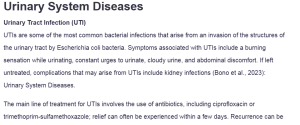Urinary System Diseases
Urinary Tract Infection (UTI)
UTIs are some of the most common bacterial infections that arise from an invasion of the structures of the urinary tract by Escherichia coli bacteria. Symptoms associated with UTIs include a burning sensation while urinating, constant urges to urinate, cloudy urine, and abdominal discomfort. If left untreated, complications that may arise from UTIs include kidney infections (Bono et al., 2023): Urinary System Diseases.
The main line of treatment for UTIs involves the use of antibiotics, including ciprofloxacin or trimethoprim-sulfamethoxazole; relief can often be experienced within a few days. Recurrence can be reduced by taking precautions such as increased intake of fluids and hygiene practices.
Kidney Stones
These are a result of mineral and salt deposits in the kidneys, usually from dehydration, high-sodium diets, or some types of health conditions. Sharp pains at the back or side, nausea, and hematuria arise from these rocks. Medications that can help mitigate the pain and increase water intake are usually prescribed to help the patient pass the stone if the stone is small enough. Larger stones may need surgical removal or other procedures, such as extracorporeal shock wave lithotripsy, to break them into smaller fragments that can easily pass through the system (National Library of Medicine, 2019).
Chronic Kidney Disease (CKD)
CKD is the progressive loss of renal functions. Some of the most common causes are long-standing diabetes and hypertension. Symptoms include fatigue, swelling of the extremities, and high blood pressure.
If untreated, the disease progresses to renal failure (Vaidya & Aeddula, 2024). Treatment options are symptomatic and include medications to control blood pressure and blood sugar, such as ACE inhibitors or angiotensin II receptor blockers, combined with lifestyle changes like diet and exercise to alleviate the load on the kidneys.
Bladder Cancer
Bladder cancer originates in the lining of the bladder and presents symptoms such as blood in the urine, frequent urination, and pain while urinating. Risk factors include smoking and contact with industrial chemicals. The treatment depends upon the stage the cancer has reached and includes surgery to remove tumors, chemotherapy, and radiation therapy that kills the cancer cells (Kaseb & Aeddula, 2020). Early diagnosis and treatment according to condition and circumstances are very important for better outcomes with a low risk of recurrence.
Interstitial Cystitis
Intermittent Cystitis, also colloquially referred to as painful bladder syndrome, is a chronic condition that causes bladder and pelvic pain. During periods of stress and with indulgence in physical activities, symptoms tend to worsen. Affected individuals very often complain of frequency and urgency of urination.
Various forms of management include medications such as pentosan polysulfate sodium or even physical therapy for the palliation of symptoms. Symptoms can also be treated through behavioral changes, bladder training programs, and lifestyle alterations, including diet modification. These help enhance the quality of life in such patients.
References
Bono, M. J., Reygaert, W. C., & Leslie, S. W. (2023). Urinary tract infection. National Library of Medicine; StatPearls Publishing. https://www.ncbi.nlm.nih.gov/books/NBK470195/
Kaseb, H., & Aeddula, N. R. (2020). Bladder cancer. PubMed; StatPearls Publishing. https://www.ncbi.nlm.nih.gov/books/NBK536923/
National Library of Medicine. (2019, February 28). Kidney stones: Overview. Nih.gov; Institute for Quality and Efficiency in Health Care (IQWiG). https://www.ncbi.nlm.nih.gov/books/NBK348937/
Vaidya, S., & Aeddula, N. (2024). Chronic kidney disease. Nih.gov; StatPearls Publishing. https://www.ncbi.nlm.nih.gov/books/NBK535404/
ORDER A PLAGIARISM-FREE PAPER HERE
We’ll write everything from scratch
Question 
Discussion 2
The purpose of this discussion forum is to create a collaborative environment in which you can strengthen your use of medical terminology and critical thinking skills while constructively sharing ideas and opinions regarding medical ideas and scenarios.1. Topic: Go to the CDC.gov website and key in at least 5 urinary system diseases. Next, write a paragraph about each of the diseases based on what you find. Include signs and symptoms as well as medications and treatments.

Urinary System Diseases
